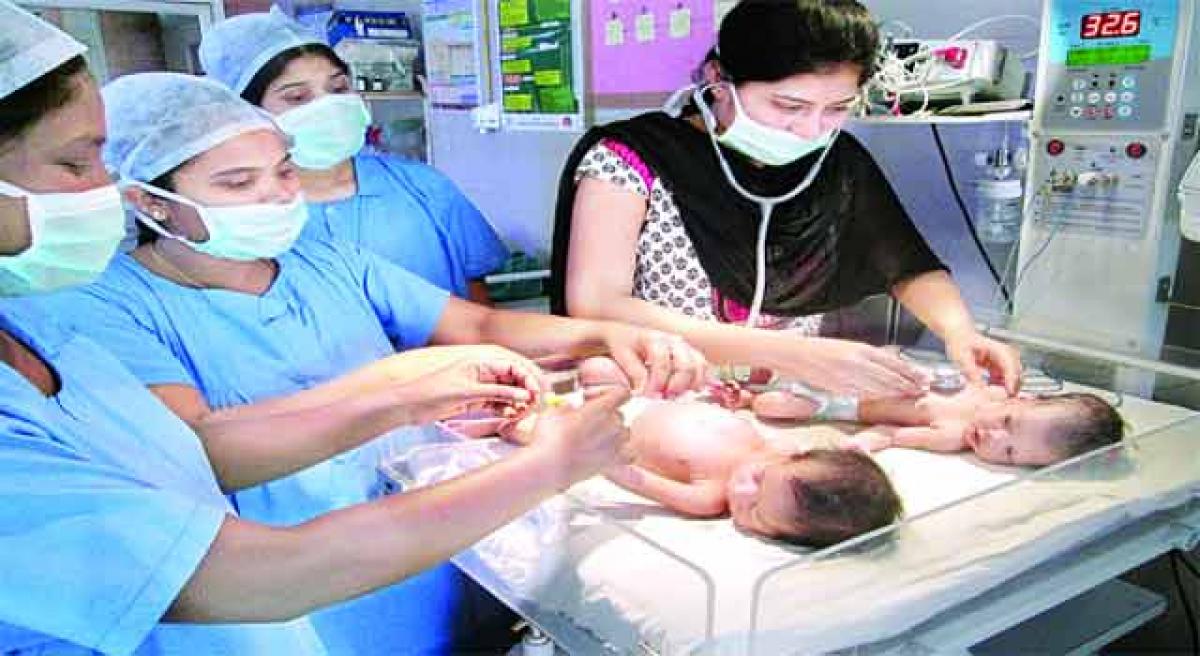A govt hospital blazes new trails

At a time when people are more inclined towards getting their babies delivered in private corporate hospitals despite exorbitant medical bills, at least there is one case where private hospitals are referring unhealthy newborns to the Special Care Newborn Unit (SCNU) at Sangareddy Government Hospital, which has successfully been offering secondary-level support to newborns.
Sangareddy: At a time when people are more inclined towards getting their babies delivered in private corporate hospitals despite exorbitant medical bills, at least there is one case where private hospitals are referring unhealthy newborns to the Special Care Newborn Unit (SCNU) at Sangareddy Government Hospital, which has successfully been offering secondary-level support to newborns.
- SCNU was set up in October 2012
- The unit has one pediatrician, four medical officers and 14 staff nurses
- Kangaroo mother care room’ special attraction
- 180-200 newborn babies are treated every month
The SCNU was established in October 2012 in order to give specialised care to newborn babies with conditions like low birth weight, prenatal jaundice, sepsis cases (infections), birth asphyxia (when babies do not cry immediately after birth and are most vulnerable to seizures and brain damage as a result), respiratory distress, intrauterine growth restriction (poor body growth in mother’s womb), hypothermia, hypoglycemia and meconium aspiration syndrome, among other birth complications.
The special care unit has one pediatrician, four medical officers (one medical officer works 24 hours on any given day) and 14 staff nurses (6-4 nurses per shift).
There is a step down room, where any just delivered baby is put in observation for 24 hours and discharged if the baby is healthy. The most interesting part is the ‘kangaroo mother care room’, where mother and baby are wrapped together for couple of hours, twice a day.
This is done to establish body contact between the mother and the baby. Advantages of doing so are that the baby would gain weight, right body temperature would be maintained in the baby through mother-to-baby warming and it would also increase the mother’s breast-feeding capacity. There is also a separate room for breast-feeding.
Pre-term babies (born before normal delivery time) are treated separately and other term babies (delivered in normal 9 months time) with complications are treated separately.
Syringe pumps, infusion pumps, 20 radiant heat warmers (to maintain body temperature of babies), phototherapies (to treat prenatal jaundice), CPAP (continuous positive airway pressure - used to treat respiratory distress), oxygen concentrators (to provide oxygen to the babies), pulse to monitor pulse rate and saturation and gavage feeding equipment are some of the sophisticated equipment available in the SCNU.
The nurses here are also trained to give intubation in case of asphyxiation. Last year, a couple, Pushpamma and her husband, abandoned their newborn girl child in the hospital, after finding out that their baby was just 1 kilo at the time of birth.
The baby fell to 940 grams on the 10th day. With exceptional care given by the SCNU medical team, in 79 days, the baby weighed 1.778 kilo grams. After three months, the baby’s parents who abandoned her, came back to take her home.
This is just one out of several accomplishments. Medak district is very well known for babies being abandoned by parents. Those newborns are given special care in SCNU and are shifted to Shishu Griha (toddler orphanage), from where they are given out for adoption.
Because of its efficient secondary-level support, SCNU has received IIA accreditation level in special care neonatal units in April 2015, from National Neonatology forum (India). Only SCNUs at Sangareddy and Nalgonda have received the accreditation in Telangana until now. However, there is no full-fledged ventilator support system for newborns in SCNU.
Any case which needs continuous ventilation would be referred to Nilofer Hospital in Hyderabad. According to Shravya, Medical Officer, SCNU, after 21 days of treatment for low-birth babies at SCNU, they need to be sent for retinopathy of prematurity test, for which currently the babies are being sent to LV Prasad Eye Hospital in Hyderabad.
She feels that an ophthalmologist at SCNU would prevent such discomfort to newborns in travelling back and forth in such crucial days.
Speaking to The Hans India, she also revealed that two more CPAP equipments and a separate ward, instead of a room for kangaroo mother care would be very helpful.
As per her data, 180-200 newborn babies are treated at SCNU every month and 2-3 babies unfortunately die even after great efforts are put in to save them.








